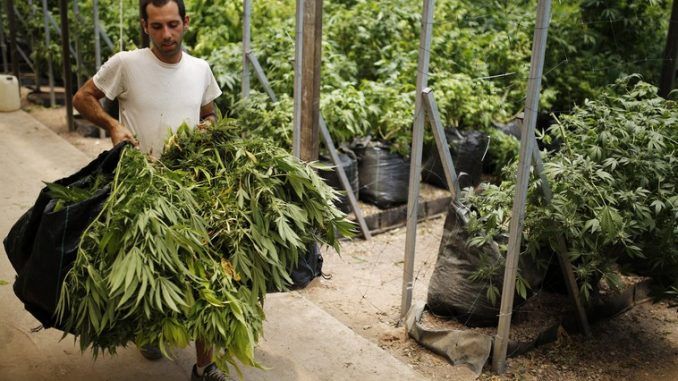
Iran is considering legalising cannabis after a recent conference was held on addiction in the Iranian capital Tehran.
A prominent Iranian official, Saeed Sefatian, head of the working group on drug demand reduction in the Council for the Discernment of the Expediency of the State, suggested legalising both cannabis and opium in a move to counter Iran’s current failing drug policy.
Newrepublic.com reports:

BYPASS THE CENSORS
Sign up to get unfiltered news delivered straight to your inbox.
You can unsubscribe any time. By subscribing you agree to our Terms of Use
Time is ripe for a shift in focus on a new subject, which has remained largely undiscussed over the past decade: drug use (as opposed to addiction) among the general population.As Sefatian has said, the state needs to manage all areas of drug policy: cultivation, production, supply and consumption.
However, rather than implying a swift liberalisation of illicit drugs, Sefatian suggested another direction: re-introducing the cultivation of plants such as poppy and cannabis under state supervision; legalisation of cannabis and opium use under specific circumstances outlined by ad hoc laws, for instance, only in private places and for opium—as he told me—only for people above a certain age. The latter, in particular, is reminiscent of pre-1979 revolution drug laws where opium vouchers were distributed to all registered opium users above the age of 50. The current regime already envisages the prescription of opium tincture to drug abusers registered at state addiction centres, therefore the ground for selective legalisation is in part paved.
Given that cannabis and opium are both indigenous plants that have had a historical presence in Iran, they are also a good place to start a new indigenous approach to drug control. The way this new strategy towards drug use is taking shape is that of a comprehensive discussion among Iran’s drug policy, addiction, anti-narcotics and social policy experts through the Expediency Council, which is the institution that has the power to carry out this change.
This is no smooth process or fast-track plan and, indeed, the obstacles and critics to a potential redirection in drug policy are many. Conservative politicians emphasise that drug use is fundamentally criminal and must be repressed—a very similar argument made by prohibitionist advocates in the US. Many in the medical community think that drugs should be illegal because of the potential for harm and that the current policy is sufficient to keep the risk of HIV and addiction disorder under control. Notwithstanding this, the advantages of a new legalisation process outweigh its risks.
A more radical model
If Iran were able to reform its drug policy, the prison population would drop remarkably (given that in the current condition, about 60-70% of inmates are charged with drug-related offences). The state would access new economic resources – through the production and selling of previously illegal drugs – which are today the turf of large criminal networks. The agricultural sector would benefit greatly from the cultivation of cannabis and poppy and the land is suitability for these crops.
New financial resources could enhance public awareness campaigns. Use of harder drugs, such as heroin and shisheh (methamphetamine), hassurged in the past decade and represent a more s issue. As the Iron Law of prohibition has it, “the harder the enforcement, the harder the drugs”. And new reforms around cannabis and opium could disincentivise use of harder ones.
Eventually, along the legalisation process, Iran’s high number of death sentences, which is a principle side-effect of the country’s war on drugs, would be almost nullified. New resources could be invested into the development of infrastructures, creation of employment and tourism of those regions which have been paying the high price of drug use and drug trafficking, especially border regions.
What is perhaps more important in this debate is the opportunity for the political class and the public to address the phenomenon of drug use beyond the all-embracing stereotype of addiction and the addict. By doing so, there is also a chance for a nuanced policy in which recreational use – which is regardless of prohibition, rampant – is not criminalised and punished. This won’t solve all of Iran’s problems with drugs and addiction, but would potentially open up a venue for comprehensive and open-ended discussions about the objectives and means of drug control.
If successful, Iran could become a model for other countries, especially in the Middle East and North Africa, which given the current levels of trauma and distress, are having or will probably witness increasing levels of drug use.


Let’s face it. Allah is a real Demon from Hell, MuhamMAD is a Camel-fucked Nutcase, Muslims are Shit-brained Zombies, Jihadists are Killer rabies-infected Mad Dogs from the ass of Satan, the Koran makes prime Toilet Paper and Diarrhea Law is an infernal concoction of Sadistic practices that slaughter Innocents!
Let’s face it. Allah is a real Demon from Hell, MuhamMAD is a Camel-fucked Nutcase, Muslims are Shit-brained Zombies, Jihadists are Killer rabies-infected Mad Dogs from the ass of Satan, the Koran makes prime Toilet Paper and Diarrhea Law is an infernal concoction of Sadistic practices that slaughter Innocents!
Good for you Iran.
You can’t fix your internal struggles all at once.. at least people will begin to mellow out.
Good for you Iran.
You can’t fix your internal struggles all at once.. at least people will begin to mellow out.